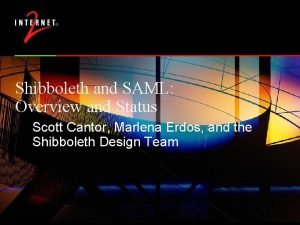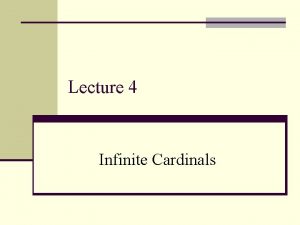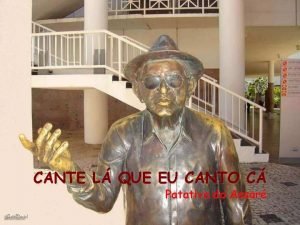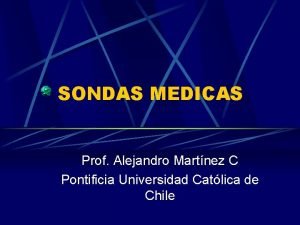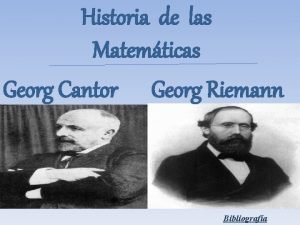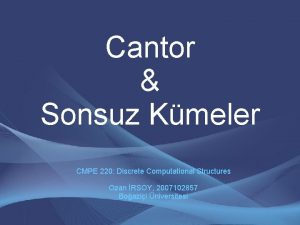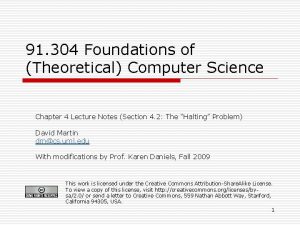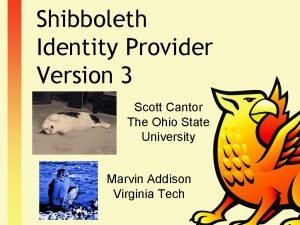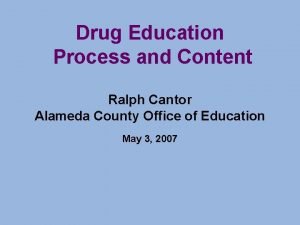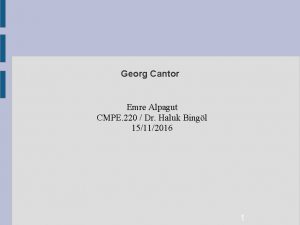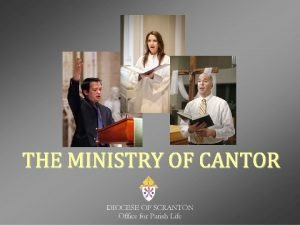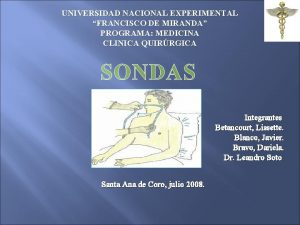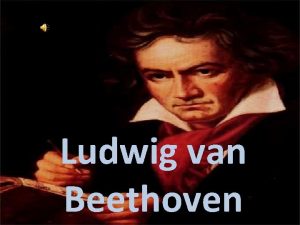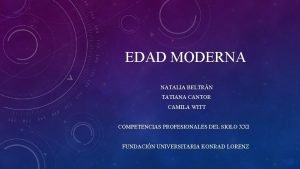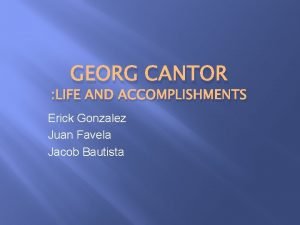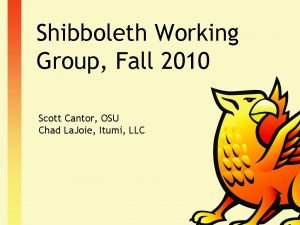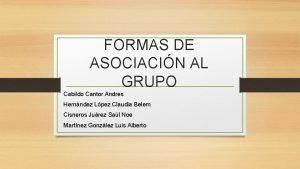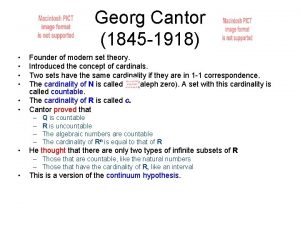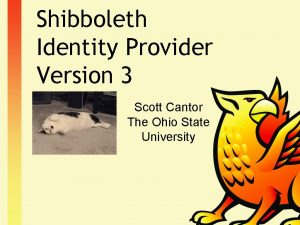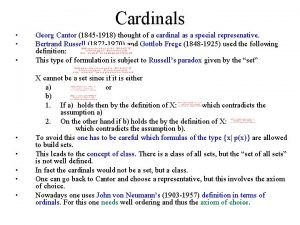The Ministry of Cantor OUTLINE I Ministry in


























































- Slides: 58


The Ministry of Cantor OUTLINE I. Ministry in the Church II. Role of the Cantor A. B. Why do we sing at Mass? Basic requirements of the ministry C. History of the Ministry III. The Liturgy A. B. The Eucharist Music in the Mass IV. Serving as a Cantor at Mass V. Practicum

Understanding of Ministry

Ministry in the Church § Baptismal Call § To serve others--“Reborn as sons of God, the baptized must participate in the apostolic and missionary activity of the People of God” (CCC 1270). § To participate in the liturgy—“The baptismal seal enables and commits Christians to serve God by a vital participation in the holy liturgy of the Church” (CCC 1273).

I Corinthians 12: 4 -7 “There are different kinds of spiritual gifts but the same Spirit; there are different forms of service but the same Lord; there are different workings but the same God who produces all of them in everyone. To each individual the manifestation of the Spirit is given for some benefit. ” • There are various ministries in liturgy • Each member is called to play a different role • Must discern our gifts and call by God to share those gifts

Ministry in the Church Each person has been given a gift from God GIFT Each person is called to share that gift with the Body of Christ NEED Realizing our gift comes from God HUMILITY

Ministry in the Church Definition of Ministry from The Ministry of Music by Fr. William Bauman “Ministry is service rendered out of love, and with a deep respect for the person served, after the model of Jesus. Ministry is never self-seeking; ministry is giving, and it is the kind of giving in which one loves the person one gives to. ”

Ministry in the Church Ministry is not: • Acting better or holier than another • Creating an elite in the parish • Rewarding someone • Self-gratifying performance Ministry is: • Humility • A way of achieving our own salvation • Helping others move toward the Lord.

Ministry as Servant Leadership Wounded and Loved, Regathering the Scattered Bishop Bambera’s Pastoral Vision for the Church of Scranton § Footwashing at the Last Supper—John 13: 1 -15 § “We are called to lead lives deeply rooted in service— service to our God, neighbor, self, and creation” (6). § “Serving, one comes to realize that service to God and neighbor is also an act of leadership that differs in kind and orientation from what normally counts as leadership. Christian disciples lead as a result of faith, not because of personal success or institutional commitment” (6).

Ministry as Servant Leadership Wounded and Loved, Regathering the Scattered Bishop Bambera’s Pastoral Vision for the Church of Scranton § One of Bishop Bambera’s goals for servant leaders who worship is “Find ways to promote: liturgical catechesis in the parish, and improved quality of participation by parishioners of all ages in Sunday Mass, the calling of men and women to liturgical ministries, the training of liturgical ministers, both spiritually and functionally, and improved use of music and art to enhance liturgical celebrations in a way that the world can comprehend” (10).

Beginning Your Ministry • Examine how your gifts can best be shared • Take into consideration the preparation and time required • Attend theological and practical training necessary for this ministry • Be commissioned by the pastor for that particular ministry • Embrace forms of personal prayer that connect you to your particular area of service • Receive ongoing formation in that ministry – – – Prayer Study Attendance at parish or diocesan periods of reflection

Discussion Why have you agreed to serve as a cantor in your parish or community?

The Role of the Cantor

Why Do We Sing at Mass? Sing to the Lord: Music in Divine Worship # 2 • Song has individual and communal dimension • • • Speaks to emotional part of human beings • Left brain—understanding words and concepts • Right brain—understands and communicates feelings Unites our hearts and minds to each other in prayer Expresses the sacramental presence of God (Mt 18: 20)

Why Do We Sing at Mass? General Instruction of the Roman Missal #40 “Great importance therefore should be attached to use of singing in the celebration of the Mass, with due consideration for the culture of the people and abilities of each liturgical assembly. ” St. Augustine— • “He who sings, prays twice.

Role of the Cantor Particular functions of the ministry: • • General Instruction of the Roman Missal # 104: • “It is fitting that there be a cantor or a choir director to lead and sustain the people’s singing. When in fact there is no choir, it is up to the cantor to lead the various chants, with the people taking part. ” Sing to the Lord Music in Divine Worship # 37 • Singer and leader of congregational song • Cantor may sing in alternation or dialogue with assembly. • May serve as psalmist

Basic Requirements of the Cantor • Pleasant singing voice with which the community can be comfortable • Voice with the ability to project and enunciate • Confidence with singing and speaking in front of others • Dedicated to preparation and rehearsal

Basic Requirements of the Cantor • • • Animated expression Prayerfully internalize the texts you sing An innate sense of hospitality

Basic Requirements of the Cantor • Should be fully initiated Catholics in good standing and active members of the parish • Must participate fully in the liturgy • Ongoing prayer and formation in your ministry

Discussion Has music ever moved you to prayer?

History of the Ministry of Cantor Song of Moses—Exodus 15: 20 -21 • One of the oldest compositions in the Bible • If traveling, they probably had a song leader

History of the Ministry of Cantor The Psalms—the first cantor hymnal • “Psalm” from Greek term psalmoi meaning “instrumental music” • A total of 150 in number • Expression various emotions, different structures, different purposes • Attributed to King David, but probably written by a number of people over the course of a few centuries • Used in Jewish worship but reinterpreted in Christ

History of the Ministry of Cantor Early Christianity • • Emerging Christianity— “heightened” form of speech, some musicality 4 th Century—psalmists perform psalm differently than other readings Post-Constantine period—series of books developed containing various chants for Mass 8 th Century • • • series of books combined into full missal Priests began to “read” chanted texts Gregorian chant and polyphony developed

History of the Ministry of Cantor 16 th Century—Protestant reformers began to develop vernacular hymnody that was singable and enduring

History of the Ministry of Cantor Reforms of the Second Vatican Council— Constitution on the Sacred Liturgy (1963) • • Full, conscious and active participation of the faithful Use of the vernacular Expanded use of Scripture at Mass Strong emphasis on the participation in song— “Bishops and other pastors of souls must be at pains to ensure that whenever a liturgical service is to be celebrated with song, the whole assembly of the faithful is enabled…to contribute the active participation that rightly belongs to it” (CSL 114).

Discussion How has singing made a difference in your life?

The Sacred Liturgy

The Sacred Liturgy § Catechism definition: “…the participation of the People of God in ‘the work of God. ’ Through the liturgy, Christ, our redeemer and high priest, continues the work of our redemption in, with, and through his Church” (CCC 1069). § Greek word—leitourgia—meaning “work done on behalf of the people. ” § “Work of God” accomplished through Christ in which we participate § Silent § Spoken § Sung

The Sacred Liturgy § General term for the official public worship of the Church § The source and summit of all activity in the Church (CSL 10) § Various liturgy in the Church § § Eucharist (the Mass)—first and foremost The Sacraments Liturgy of the Hours Liturgy of the Word

The Sacred Liturgy § The Life of the Church § The work of our redemption accomplished § Express and manifest to others the Paschal Mystery of Christ § Christ is present in: § The Eucharistic elements (par excellence) § Person of the minister § In the Sacraments § In the Word proclaimed § In the Church gathered (Mt. 18: 20)

The Eucharist “The Eucharist, the sacrament of our salvation accomplished by Christ on the cross, is also a sacrifice of praise and thanksgiving for the work of creation. In the Eucharistic sacrifice the whole of creation loved by God is presented to the Father through the death and resurrection of Christ. “ (CCC 1359) 1. 2. 3. Christ’s sacrifice is perpetuated We offer the sacrifice of ourselves to Christ’s sacrifice The whole of creation is also offered to the Father.

The Eucharist Future Glory: “In the earthly liturgy, we take part in a foretaste of that heavenly liturgy celebrated in the holy city of Jerusalem toward which we journey as pilgrims…” (CSL 8)

Music in the Mass Introductory Rites • Entrance Chant—“The purpose of this chant is to open the celebration, foster the unity of those who have been gathered, introduce their thoughts to the mystery of the liturgical season or festivity, and accompany the procession of the priest and ministers” (GIRM 47) • Penitential Act (Kyrie) or Sprinkling Rite • Gloria—“The Gloria is a very ancient and venerable hymn in which the Church, gathered together in the Holy Spirit, glorifies and entreats God the Father and the Lamb” (GIRM 53)

Music in the Mass Liturgy of the Word • Psalm Response • • • intended to foster reflection on the First Reading “Because the Psalm is properly a form of sung prayer, every means available in each individual culture is to be employed in fostering the singing of the Psalm at Mass…” (STL 158). Since it is part of the Scripture proclaimed at Mass, the psalm should be sung from the ambo

Music in the Mass • Gospel Acclamation • • Alleluia (except during Lent) with solo verse Alternate acclamations used during Lent May be repeated to accompany the length of the Gospel procession If not sung, it may be omitted. • Universal Prayer (Prayer of the Faithful)

Music in the Mass Liturgy of the Eucharist • Preparation of the Gifts • The Eucharistic Prayer— • “In order to make clear the ritual unity of the Eucharistic Prayer, it is recommended that there be a stylistic unity to the musical elements of the prayer, especially the Sanctus, the Memorial Acclamation and the Great Amen” (STL 178).

Music in the Mass Sing to the Lord: Music in Divine Worship • Sanctus/Holy, Holy—“the great cosmic acclamation of praise” (180) • Memorial Acclamation—“by which the faithful participate in keeping the memory of Christ’s Paschal Mystery” (180) • Amen—“by which they give their assent to the entire prayer” (180).

Music in the Mass The Fraction Rite (Agnus Dei) • • • Sung by the choir or cantor with the congregation responding Should accompany the ritual action for as long as it takes “Lamb of God” is the only invocation to be used

Music in the Mass The Communion Chant • “Its purpose is to express the communicants’ union in spirit by means of the unity of their voices, to show joy of heart, and to highlight more clearly the ‘communitarian’ nature of the procession to receive Communion” (GIRM 86). • “The singing begins immediately and continues for as long as the Sacrament is being administered to the faithful. ” (GIRM 86)

Music in the Mass The Communion Chant • “It is recommended that psalms sung in the responsorial style, or songs with easily memorized refrains be used. ” (STL 192) • “Care should be taken to ensure that the musicians (singers and instrumentalists), too, can receive Communion with ease. ’” (STL 195)

Music in the Mass The Recessional Hymn • Optional • Sending Forth function

Music in the Mass Other music in the liturgy • Chanted responses/dialogue • • • Greeting Kyrie Alleluia Prayer of the Faithful Preface dialogue The Lord’s Prayer Agnus Dei Dismissal Double Alleluia Dismissal • Occasional chants • • Litany of the Saints Sequence (Easter & Pentecost)

Serving as a Cantor at Mass

Serving as a Cantor at Mass Advanced Preparation = CONFIDENCE • • • Knowing the music for Mass in advance Make arrangements with organist/accompanist to practice Learn new music Recordings of the music (require copyright permission) Review introductions and interludes

Serving as a Cantor at Mass Practice and review the music on your own • • • Develop a great familiarity and comfort with the melody Just listen to the melody first Develop an ear for it so that you can hum it on your own

Serving as a Cantor at Mass Preparing the Psalm • • Read the Psalm aloud add the proper pauses and inflections the emotion conveyed through interpretive reading should be the same when you sing it Pray with the psalm • • Read through First Reading Look at the other readings for the day

Serving as a Cantor at Mass Preparing the Psalm • • • “Take your time…but hurry up” “Put on the brakes” “You’re proclaiming the psalm, you just happen to be singing it. ”

Serving as a Cantor at Mass Hymns and Acclamations • • • Pray with the text, perhaps look at the readings and look for connections Practice singing with music Acclamations and the Lamb of God should be nearly memorized

Serving as a Cantor at Mass Attire • “Bodily demeanor (gestures, clothing) ought to convey the respect, solemnity and joy of the moment when Christ becomes our guest” (CCC 1387 b). • dress in a way that is dignified and shows respect for the Blessed Sacrament and your function as a cantor at Mass • Nothing should be worn that calls attention to the cantor, such as logo shirts or revealing clothing

Serving as a Cantor at Mass Procedure before Mass • • Begin to warm up your voice at home—please do not count on the organist or accompanist to do this for you. Stretching—yawning, chewing, rolling and massaging the neck and shoulders, massaging your face Continue with vocal exercises, beginning with descending scales first, humming tritones with the lips loosely together so they vibrate Sing lightly at first and then gradually grow in energy

Serving as a Cantor at Mass • Arrive well before the scheduled Mass time • You should already know the music you are going to be singing, although you may have to be flexible with some details or last-minute changes • Review introductions and interludes with the organist or accompanist • Know what cues from the organist/accompanist mean what • Check in with the priest, deacon or sacristan for the Mass regarding any musical matter that may affect him or for any out of the ordinary in the liturgy that may affect the music

Serving as a Cantor at Mass • • Know when you are to receive Communion Make any adjustments necessary to your chair or microphone (microphone properly lined up with your mouth, especially looking down at the music) Consult your parish music director about any other preparations you should make before Mass Spend the last few minutes before Mass in personal prayer

Serving as a Cantor at Mass Rehearsal with the congregation before Mass • • • Keep it short and concise Sing through it once, ask the assembly to repeat it twice If a longer refrain, ask them to repeat a phrase after you, and then put the whole thing together twice This is best and more efficient unaccompanied Only do this when needed—specifically for refrains or acclamations where the congregation doesn’t have a book in front of them

Serving as a Cantor at Mass Cantor as a visual ministry • • “A true cantor lets the congregation know that the best compliment they can give is to join in” (The Parish Cantor Michael Connolly). More than having a good singing voice, the cantor needs to engage the congregation in order to foster their sung participation Eye contact—especially at the beginning and end of refrains and verses Arm gestures • • Cued whenever assembly’s turn to sing Sync with inhalation

Serving as a Cantor at Mass • • • Making announcements slowly and clearly Give them time to find their page in the hymnal Get them started on a song they are familiar with and then back off Continue to sustain the singing if it’s a newer song Conveying a presence that you’re happy to be there (and that you’re happy THEY’RE there too) Smile

Serving as a Cantor at Mass “Troubleshooting” • No matter what: DON’T STOP SINGING • Establish “preset rules” with organist/accompanist • • • What to do if a cantor/organist accidentally skips a verse What to do if a cantor fails to come in at the correct time If the cantor can’t see gestures from the organist, develop “listening cues” • Sound delays in churches • Organist/Accompanist sets the tempo

Questions?

Practicum
 Scott cantor
Scott cantor Cantor fitzgerald dst
Cantor fitzgerald dst Cantor
Cantor Cantor set fractal dimension
Cantor set fractal dimension State and prove schroeder bernstein theorem
State and prove schroeder bernstein theorem Lavacuator tube
Lavacuator tube Poeta cantor de rua que na cidade nasceu
Poeta cantor de rua que na cidade nasceu Sonda malecot
Sonda malecot Biografía de riemann
Biografía de riemann Cmpe 220
Cmpe 220 Cantor theorem
Cantor theorem Scott cantor shibboleth
Scott cantor shibboleth Ralph cantor
Ralph cantor Georg cantor vally guttmann
Georg cantor vally guttmann Mass attire
Mass attire Sonda nasogastrica ewald
Sonda nasogastrica ewald Sentence outline examples
Sentence outline examples Bổ thể
Bổ thể Từ ngữ thể hiện lòng nhân hậu
Từ ngữ thể hiện lòng nhân hậu Tư thế ngồi viết
Tư thế ngồi viết V cc
V cc Thơ thất ngôn tứ tuyệt đường luật
Thơ thất ngôn tứ tuyệt đường luật Alleluia hat len nguoi oi
Alleluia hat len nguoi oi Sự nuôi và dạy con của hươu
Sự nuôi và dạy con của hươu đại từ thay thế
đại từ thay thế Diễn thế sinh thái là
Diễn thế sinh thái là Vẽ hình chiếu vuông góc của vật thể sau
Vẽ hình chiếu vuông góc của vật thể sau Công thức tiính động năng
Công thức tiính động năng Phép trừ bù
Phép trừ bù Tỉ lệ cơ thể trẻ em
Tỉ lệ cơ thể trẻ em Thế nào là mạng điện lắp đặt kiểu nổi
Thế nào là mạng điện lắp đặt kiểu nổi Lời thề hippocrates
Lời thề hippocrates Vẽ hình chiếu đứng bằng cạnh của vật thể
Vẽ hình chiếu đứng bằng cạnh của vật thể Quá trình desamine hóa có thể tạo ra
Quá trình desamine hóa có thể tạo ra Môn thể thao bắt đầu bằng chữ f
Môn thể thao bắt đầu bằng chữ f Khi nào hổ con có thể sống độc lập
Khi nào hổ con có thể sống độc lập Hát kết hợp bộ gõ cơ thể
Hát kết hợp bộ gõ cơ thể Dot
Dot Biện pháp chống mỏi cơ
Biện pháp chống mỏi cơ Trời xanh đây là của chúng ta thể thơ
Trời xanh đây là của chúng ta thể thơ Phản ứng thế ankan
Phản ứng thế ankan Voi kéo gỗ như thế nào
Voi kéo gỗ như thế nào Thiếu nhi thế giới liên hoan
Thiếu nhi thế giới liên hoan Vẽ hình chiếu vuông góc của vật thể sau
Vẽ hình chiếu vuông góc của vật thể sau điện thế nghỉ
điện thế nghỉ Một số thể thơ truyền thống
Một số thể thơ truyền thống Thế nào là hệ số cao nhất
Thế nào là hệ số cao nhất Sơ đồ cơ thể người
Sơ đồ cơ thể người Ng-html
Ng-html Số nguyên tố là số gì
Số nguyên tố là số gì đặc điểm cơ thể của người tối cổ
đặc điểm cơ thể của người tối cổ Mật thư tọa độ 5x5
Mật thư tọa độ 5x5 Các châu lục và đại dương trên thế giới
Các châu lục và đại dương trên thế giới Tư thế worm breton là gì
Tư thế worm breton là gì ưu thế lai là gì
ưu thế lai là gì Thẻ vin
Thẻ vin Tư thế ngồi viết
Tư thế ngồi viết Bàn tay mà dây bẩn
Bàn tay mà dây bẩn Các châu lục và đại dương trên thế giới
Các châu lục và đại dương trên thế giới
